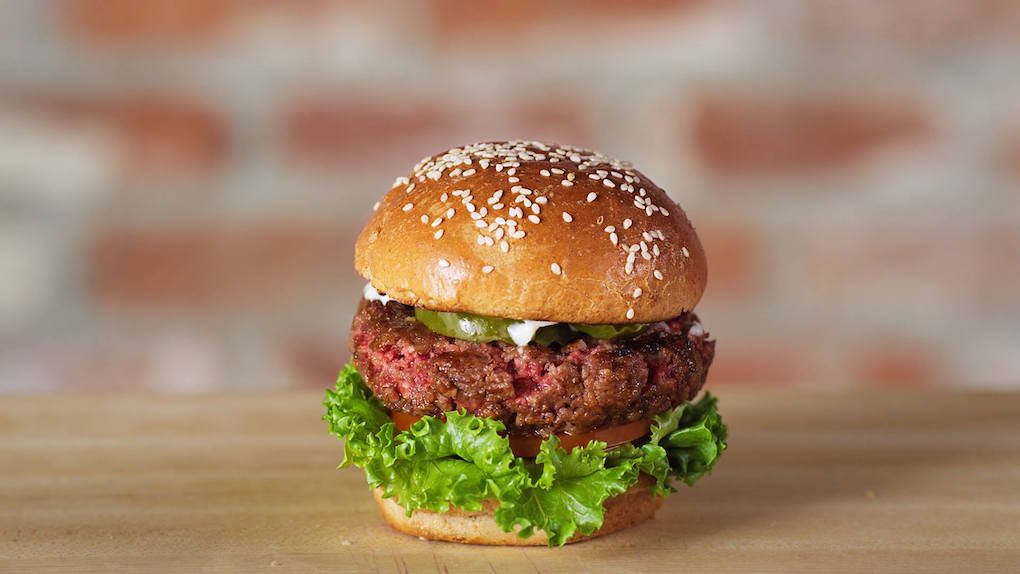Vegan Meat is Now the Biggest Trend in the Tech Industry

Vegan meat may sound like an oxymoron, but it’s proving to be the future of meat as we know it. Through the work of scientists and renowned chefs, it’s regularly dominating spots on plates millions of Americans long reserved for animal products. And it’s also dominating something else: the booming tech industry.
At the recent 2016 Milken Institute Global Conference in Los Angeles, Eric Schmidt, executive director of Alphabet, Google’s parent company, listed plant-based proteins as the most important trend in tech, beating out 3D printing, self-driving cars, mobile medical data, virtual reality, and education programs.
According to the Good Food Institute, an organization that specializes in supporting the development of plant-based food products, Schmidt predicts we’re entering a “revolution of replacing livestock with plant proteins.”
“[S]hifting from conventional meat to plant-based foods would reduce greenhouse gas emissions and fight climate change,” writes GFI’s Brian Kateman.
Schmidt explained that focusing tech industry efforts on developing plant-based vegan meat could significantly reduce the cost of food production in developing nations. As the taste for animal products continues developing alongside the growth of these nations, the global environmental impact of animal production is only expected to rise. But, writes Kateman, “a switch to plant protein will remove the animal from the equation and allow harvesting of plants for direct human consumption.”
Just how is technology helping to build a better burger?
Computers aren’t exactly known for being great chefs (yet), but technology is advancing research efforts in plant identification and formulation that makes for delicious and highly nutritious foods without the health and foodborne illness risks of animal products. It’s even being used in growing “meat” without the animal—a lab-grown burger was recently tested in the UK to rave reviews.
Beyond Meat, a Southern California plant-based meat company, recently released the first veggie burger so meaty its being sold in the meat case alongside animal products. On its first day in the store (a Boulder, Colo., Whole Foods Market), it sold out in an under an hour.
“You’re not going to make anything that appeals to a hardcore meat lover by mushing together a bunch of vegetables,” Pat Brown, founder and CEO of the plant-based food startup Impossible Foods, told the Code Conference in California last month. “So we had to do a deep, molecular investigation into what it is that accounts for the desirable properties – texture, juiciness, the aromas, how it cooks.”
Impossible Foods, which has raised more than $180 million, and an offer to sell to Google for $300 million, is committed to making a plant-based burger so meaty that even the most devoted carnivore won’t be able to distinguish it from beef.
Just like Beyond Meat, Impossible Foods sees several benefits in simulating meat from plants: It’s better for our bodies, for the planet, and most certainly for the animals.
“Delivering a pound of meat to the grocery store (raising it, slaughtering it, shipping it) is a relatively inefficient and costly process compared with delivering a pound of many protein-based plants,” reports Fortune.
The United Nations declared 2016 “the Year of the Pulses” (legumes and beans)—they’re not only highly nutritious and versatile in the kitchen (or the high-tech lab, as it were), but they provide benefits to farmers, too. Lentils, for example, are nitrogen fixers that can replenish soil. Raising cows, chickens, or pigs does the opposite—it damages soil (and air quality and water) beyond reparations, endangering communities for generations. It also requires the razing of rainforests and uses immense amounts of critically limited resources including fresh water and antibiotics. (Animals raised on antibiotics also proliferate antibiotic resistance, which is now becoming an immense public health issue.)
And on a planet that’s getting smaller and smoggier every day, meat is more indulgent and more problematic than ever before.
“The two big questions are, how do we feed 9 billion people by 2050, and what can we do about climate change?” asks Good Food Institute executive director Bruce Friedrich. “Plant-based and [lab-grown meat] products are the answer to both of these questions.”
Find Jill on Twitter and Instagram
Related on Organic Authority
3 Vegan Meal Delivery Kits Get Put to the Toddler Test
V is for ‘Vegan’: Plant-Based School Lunches on the Rise
Eat Less Meat: Save the Planet and Everyone On It, Says New Study
[This article was updated on July 15, 2016.]
Image via Impossible Foods

